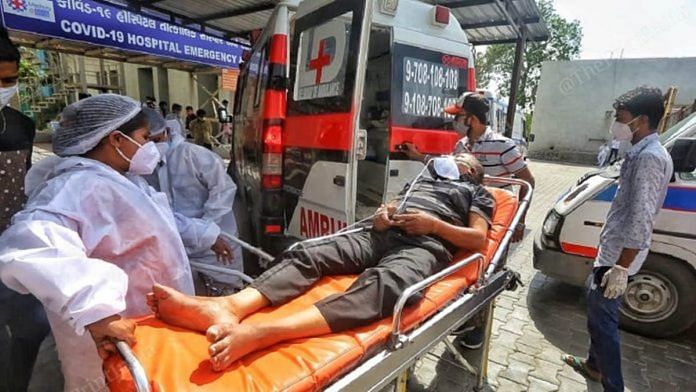New Delhi: The Indian Council of Medical Research (ICMR), India’s top medical body, tailored its findings and forced its scientists to downplay the threat of a deadly second Covid wave to prioritise Prime Minister Modi’s political goals, claims an investigative report by the New York Times released Tuesday.
Basing its investigation on a study reviewed and published by the ICMR in September 2020 — eight months before the second wave hit India — the NYT report said the ICMR’s forecast was “mathematically based, government-approved and deeply, tragically wrong”.
What the “government-appointed scientists” wrote in that study, the NYT report said, “downplayed the possibility of a new outbreak” and claimed that “infections and early lockdown efforts had tamed the spread” and further pointed out how the Indian media widely covered these predictions last year.
Noting that Covid spread was reduced due to the initial lockdown, which at the time was one of the world’s most stringent, the study published by ICMR concluded: “If there was no lockdown, the number of active infections would have peaked at close to 14.7 million, resulted in more than 2.6 million deaths, and the peak would have arrived by June 2020. The number of deaths with the current trends may be less than 0.2 million.”
The outcome, NYT claimed, helped PM Modi achieve his two main goals — “restart India’s stricken economy and kick off campaigning for his party in state elections that coming spring”.
When two of ICMR’s officials spoke to the Council’s top official in October 2020 — Balaram Bhargava — on how the study could “lull the country into a false sense of security”, both were reprimanded, the report claimed.
It further quoted Dr Anup Agarwal, one of two who was reprimanded and a former physician at ICMR, as saying, “Science is being used as a political weapon to forward the government narrative rather than help people.”
The report added that neither the ICMR nor the Union health ministry, which oversees the medical research council, responded to NYT‘s requests for comment.
Also read: Has Covid exposed limitations of ‘secretive’ ICMR? Some experts think so
‘Govt contributed to complacency’
The NYT investigation further claimed that the Modi government missed the warning signs ahead of the devastating second wave of Covid partly because “… senior officials forced scientists at elite institutions to downplay the threat to prioritize Mr. Modi’s political goals”.
It further claimed that according to researchers and documents, “Senior officials at ICMR suppressed data showing the risks and pressured scientists to withdraw another study that called the government’s efforts into question and distanced the agency from a third study that foresaw a second wave”.
Mid-level researchers concerned about missing promotions and other opportunities also resisted questioning superiors, according to ICMR’s scientists interviewed by NYT.
However, Vijay Chauthaiwale, a senior BJP leader, told the American news organisation, “Prime Minister Modi has never, ever said to lower the guard.”
The NYT report drew attention to PM Modi’s remarks this January, just months before the second Covid wave, that India had “saved humanity from a big disaster” by effectively containing Covid. A month later, then Union Health Minister Dr Harsh Vardhan said the country was “in the endgame of Covid-19”. Underlining this, the report noted how the government contributed to complacency.
Citing an instance of how “politics influenced the agency’s approach”, the NYT report pointed to the ICMR, in June 2020, withdrawing a study that claimed “PM Modi’s lockdown had slowed but would not stop the virus’s spread”. The ICMR said the study “refers to a non peer-reviewed modelling, not carried out by ICMR and does not reflect the official position of ICMR”.
The news reports attributing this study to ICMR are misleading. This refers to a non peer reviewed modelling, not carried out by ICMR and does not reflect the official position of ICMR. pic.twitter.com/OJQq2uYdlM
— ICMR (@ICMRDELHI) June 15, 2020
One of the study’s authors was quoted by NYT as saying that this was unusual for the medical body since it typically adjusts problematic language rather than demand the paper be withdrawn.
(Edited by Manasa Mohan)
Also read: Substantial third wave possible but not likely to be as severe as second one, ICMR study says



